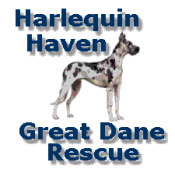|
To Do or Not to Do--That is the Question
What NOT to Do
Don't take your new dog home and leave him alone for hours on the first day or for the first few
days.
Don't invite lots of people to your home until after the
adjustment phase of 3 to 4 weeks. Definitely do not have a party for your
new dog right away. We understand that you want to show off your new dog
to your family and friends, but he needs to adjust to his new
surroundings and your family and other pets first.
Don't take your dog to work with you for the same reason as in
previous paragraph.
Don't change your dog's food right away. If you do
change foods, do it over a one week
period to avoid stomach upset.
What TO Do
Take your new dog straight home. Resist the temptation to take
her into the pet store to pick out toys and a new bed. Do your shopping
ahead of time.
Slowly introduce your new dog to your family of other animals.
Sometimes it is better to introduce new dogs outside in the fenced area
rather than in your home. Always supervise greetings, but especially
when the dog is meeting small pets such as cats and ferrets.
Remember to continue to give current pets lots of attention. If
you dwell on your new dog too much, you may see behavior issues with
your current pets. They need to know that they are not being replaced.
Try to spend as much time with your new dog as possible the first
few days.
Provide comfortable places for your dog to rest. The best thing
you can do for a Great Dane or Saint Bernard is to give them a comfy
couch or a wonderfully soft dog bed.
Use elevated feeding surfaces for giant and large breed dogs. It
is best to feed adult dogs twice a day and allow them to rest after
eating to prevent the possibility of bloat.
Take your dog to your veterinarian within 14 days for checkup and
Rabies vaccination. Take your copy of your adoption contract with you so
your vet can record the dog's medical history on his chart. After your
visit send a copy of this information to HHGDR.
While in the waiting room at the veterinarian's office do not
allow anyone, especially children, to approach your dog. Most dogs are
nervous in the vet's office and may react defensively.
Allow your dog to adjust to your family and household routine
before introducing him to lots of people. That adjustment phase should
be from 3 to 4 weeks. After that, take it slowly one thing at a time.
Watch your dog to make sure that he is comfortable with a new situation
before adding something else.
Read the information on bonding and transition.
Patience is extremely important as your dog adjusts to his new
home. You don't know what he has been through in his short life. He
needs to know that he can trust you. He needs to know it is OK to make a
mistake now and then and that you will still love him. After all, you
will make mistakes and he will definitely still love you!
The biggest mistake some people make is allowing the dog to have
his way about everything from when he is petted to when he plays to who
may be around when he is eating. A spoiled dog is just as bad as a
spoiled child; maybe even worse since we are dealing with lots of big
teeth. You must be in charge. You
decide when to play, when to pet, and you must teach your dog that it is
OK for you to be around when he is eating because you are the one providing the food.
Very important! Enroll in an obedience class. Even if you already
know how to train, it is important for the dog to be trained in a group.
This helps with bonding to you and teaches the dog how to get along with
strangers human and canine. Large strong dogs need to know good
manners. Look for positive trainers. The Association of Professional Dog Trainers web site, www.apdt.com,
can help with your search.
All images and text on this site Copyright © 1998-2026 Harlequin Haven Great Dane Rescue, Inc. unless otherwise credited. Use of any image or text without written permission is expressly forbidden. All rights reserved.
|
|
|
